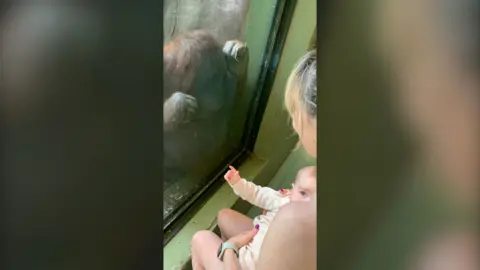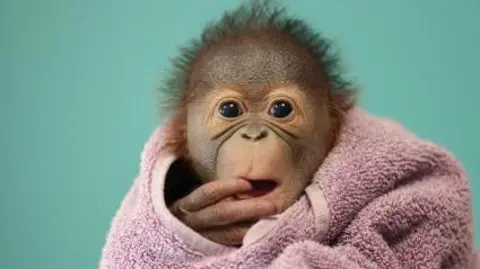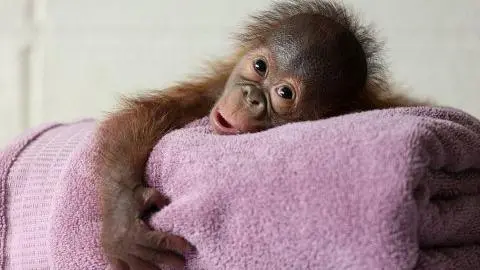Zoo enlists breastfeeding mothers to help orangutan
 Nora Murphy
Nora Murphy A group of breastfeeding mothers have been enlisted by Dublin Zoo to try to help an orangutan bond with her newborn.
The zoo's 19-year-old orangutan, Mujur, gave birth to a healthy male baby at the end of July but has not been feeding.
Over the past few months, the zoo arranged for 30 new mothers to take turns to breastfeed their children in front of the pregnant orangutan, as part of a lactation learning process.
Mujur previously gave birth to two babies, in 2019 and 2022, but the zoo said she "did not exhibit the necessary maternal qualities" and both died.
 Dublin Zoo
Dublin ZooLizzie Reeves is a clinical midwife and a specialist in lactation at the National Maternity Hospital in Dublin.
She was approached by a vet at the zoo to advise on lactation in Mujur’s case.
"It was a bit of a match made in heaven," she said. "Obviously with my area of expertise and I love these animals."
She convinced eight colleagues at the hospital to help out with the project then messaged a groupchat to ask for volunteers.
"My phone wouldn’t stop pinging" she said.
By the next day, 30 women had signed up and a rota was created for the mothers to visit the zoo with their babies.
The first woman involved was her friend Nora Murphy, who visited Mujur in April with her now 10-month old daughter Elodi.
 Dublin Zoo
Dublin ZooThe team hoped that watching the women breastfeed their infants would teach Mujur how to feed her own baby when it arrived.
"Orangutans are known to mirror behaviour," Ms Reeves said.
"Mujur had so much interest in the women, she watched them so intensely and started to recognise people."
'Women supporting women'
Ms Reeves also praised the women’s commitment to the project.
"The women were amazing. They were so dedicated and so kind to Mujur," she told BBC News NI.
"Even after the baby was born, three of the mothers came back and fed their babies in front of her.
"It was a really good example of women supporting women, regardless of species."
The zoo said it had left "no stone unturned" in its efforts to help Mujur develop maternal qualities.
She was also shown videos of other orangutans feeding their babies.
According to the zoo, these efforts had some success and Mujur showed good maternal care towards her baby after the birth, but she was not putting him in the right position for breastfeeding.
As a result, the "difficult decision" had been made to bottle feed the baby orangutan.
'Difficult decision'
Whilst Mujur did not master breastfeeding, Ms Reeves said the project was still encouraging.
"You couldn’t fault her mothering. She kissed him, cleaned him and she was so gentle with him," she said.
"Feeding was the last piece of the puzzle and we just didn’t quite get there.
"With humans you can physically help them to hold the child and get the right position but with an animal this size, it’s a totally different exercise."
Ms Reeves hopes the project could inspire similar work in the future.
'Hopelessly in love'
The baby was fathered by Sibu, Dublin Zoo’s orangutan patriarch, who died in February.
Orangutans are a critically endangered species and Sibu’s genetic profile is considered to be important for the orangutan European breeding programme.
The team at Dublin Zoo has "fallen hopelessly in love" with the baby - but hand-rearing him until independence is not a long-term option at the zoo.
The newborn will stay there for another few weeks before moving to a specialist institution in the UK, subject to necessary health checks.
The zoo said: "It will be difficult to say goodbye, however we are confident that he is being sent to the best possible place for him to continue to develop and thrive."
